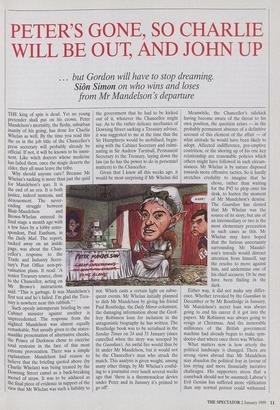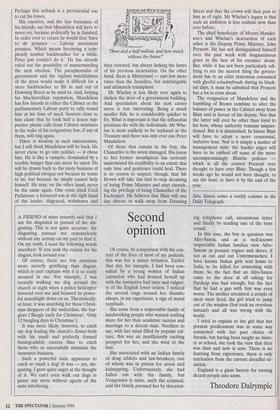PETER'S GONE, SO CHARLIE WILL BE OUT, AND JOHN UP
. but Gordon will have to stop dreaming.
Sion Simon on who wins and loses
from Mr Mandelson's departure
THE king of spin is dead. Yet no young pretender shall put on his crown. Peter Mandelson's mortality, the fleshy, suburban inanity of his going, has done for Charlie Whelan as well. By the time you read this the ex in the job title of the Chancellor's press secretary will probably already be official. If not, it will be known to be immi- nent. Like witch doctors whose medicine has failed them, once the magic deserts the elder, they all must leave the tribe. Why should anyone care? Because Mr Whelan's sacking is more than just the quid for Mandelson's quo. It is the end of an era. It is both justice, indeed nemesis, and denouement. The never- ending struggle between Blair-Mandelson and Brown-Whelan entered its final stage a month ago with a few lines by a lobby corre- spondent, Paul Eastham, in the Daily Mail. The report, tucked away on an inside page, was about the Chan- cellor's response to the Trade and Industry Secre- tary's Post Office non-pri- vatisation plans. It read: 'A senior Treasury source, close to the Chancellor, acting on Mr Brown's instructions said: "This is garbage. It was Mandelson's first test and he's failed. I'm glad the Trea- sury is nowhere near this rubbish." ' Such openly intemperate briefing by one Cabinet minister against another is unprecedented. The response from the slighted Mandelson was almost equally remarkable. Not usually given to the states- manlike presentation of alternative cheeks, the Prince of Darkness chose to exercise total restraint in the face of this most extreme provocation. There was a simple explanation: Mandelson had reason to believe that the briefing quoted above (by Charlie Whelan) was being treated by the Downing Street camel as a back-breaking morsel of straw. It was to be adduced as the final piece of evidence in support of the View that Mr Whelan was such a liability to the government that he had to be kicked out of it, whatever the Chancellor might say. As to the rather delicate mechanics of Downing Street sacking a Treasury adviser, it was suggested to me at the time that the Sir Humphreys would be mobilised, begin- ning with the Cabinet Secretary and culmi- nating in Sir Andrew Turnbull, Permanent Secretary to the Treasury, laying down the law (as he has the power to do in personnel matters) to the Chancellor.
Given that I knew all this weeks ago, it would be most surprising if Mr Whelan did not. Which casts a certain light on subse- quent events. Mr Whelan initially planned to dish Mr Mandelson by giving his friend Paul Routledge, the Daily Mirror columnist, the damaging information about the Geof- frey Robinson loan for inclusion in the antagonistic biography he has written. The Routledge book was to be serialised in the Sunday Times on 24 and 31 January (since cancelled when the story was scooped by the Guardian). An awful fire would thus be lit under Mr Mandelson, but it would not be the Chancellor's man who struck the match. This analysis is given weight, among many other things, by Mr Whelan's confid- ing to a journalist over lunch several weeks ago that 'there is a thermonuclear device under Peter and in January it's primed to go off. Meanwhile, the Chancellor's sidekick having become aware of the threat to his own position, the question arises — in the probably permanent absence of a definitive account of this element of the affair — of what attitude he would have been likely to adopt. Affected indifference, pre-emptive contrition, or the shoring up of his one key relationship are reasonable policies which others might have followed in such circum- stances. Mr Whelan is by nature disposed towards more offensive tactics. So it hardly stretches credulity to imagine that he chose, rather than waiting for the P45 to plop onto his desk, to hasten the moment ooPsi of Mr Mandelson's demise. The Guardian has denied that Mr Whelan was the source of its story, but use of an intermediary or two is the most elementary precaution in such cases as this. Mr Whelan may have hoped that the furious uncertainty surrounding Mr Mandel- son's travails would distract attention from himself, sap the resolve to move against him, and undermine one of his chief accusers. Or he may have been flailing in the dark.
Either way, it did not make any differ- ence. Whether revealed by the Guardian in December or by Mr Routledge in January, Mr Mandelson's secret loan was always going to end his career if it got into the papers. Mr Robinson was always going to resign at Christmas. And the inexorable millstones of the British government machine had already begun to make spin- doctor-dust where once there was Whelan.
What matters now is how utterly the political landscape is changed. There are strong views abroad that Mr Mandelson may abandon the political fray in favour of less trying and more financially lucrative challenges. His supporters stress that a comeback should not be assumed; Labour's Evil Genius has suffered more vilification than any normal person could withstand. Perhaps this setback is a providential cue to cut his losses.
His enemies, and the less formulaic of his friends, say that Mandelson will have to move on, because politically he is finished. In order ever to return he would first 'have to do penance — Labour movement penance. Which means becoming a com- pletely normal backbencher for a while. Peter just couldn't do it.' He has already ruled out the possibility of masterminding the next election. The paraphernalia of government and the vigilant watchfulness of the press would make it difficult for a mere backbencher to flit in and out of Downing Street as he used to. And, belying his Machiavellian reputation, Mandelson has few friends in either the Cabinet or the parliamentary Labour party to rally round him at his time of need. Sources close to him claim that he took half a dozen sup- portive phone calls from Cabinet ministers in the wake of his resignation; few, if any of them, will ring again.
There is wisdom in such ratiocination, but I still think Mandelson will be back. He never chose to go into politics — it chose him. He is like a vampire, dominated by a terrible hunger that can never be sated. He will be drawn back to the nasty business of high political intrigue not because he wants to be, but because he simply cannot help himself. He may, on the other hand, never be the same again. One cynic cited Cecil Parkinson: a favoured son at the right hand of the leader, disgraced, withdrawn and `Three and a half million, and how much without the frame?'
then restored, but always lacking the lustre of his previous incarnation. On the other hand, there is Mitterrand — cast low more times than the Israelites, but indefatigable and ultimately triumphant.
Mr Whelan is less likely ever again to darken the door of a government building. And speculation about his next career move is less interesting. Being a much smaller fish, he is considerably quicker to fry. What is important is that the influential positions die with the individuals. Mr Whe- lan is most unlikely to be replaced at the Treasury and there was only ever one Peter Mandelson.
Of those that remain in the fray, the Chancellor is the worst damaged. His (soon to be) former mouthpiece has seriously undermined his credibility to an extent that only time and penitence could heal. There is no reason to suspect, though, that Mr Brown will take this hint to stop dreaming of being Prime Minister and start cherish- ing the privilege of being Chancellor of the Exchequer. He believes that Blair will one day choose to walk away from Downing Street and that the crown will then pass to him as of right. Mr Whelan's legacy is that such an ambition is less realistic now than ever before.
The chief beneficiary of Messrs Mandel- son's and Whelan's destruction of each other is the Deputy Prime Minister, John Prescott. He has not distinguished himself over the past week with magnanimous grace in the face of his enemies' doom. But, while it has not been particularly edi- fying to see the nearest thing the govern- ment has to an elder statesman consumed with gleeful schadenfreude during its black- est days, it must be admitted that Prescott has a lot to crow about.
The resignation of Mandelson and the humbling of Brown combine to alter the balance of power in the Cabinet away from Blair and in favour of his deputy. Not that the latter will ever be other than loyal to his boss, whose authority remains unques- tioned. But it is diminished. In future Blair will have to adopt a more consensual, inclusive tone. Nor is it simply a matter of management style: the harder edges will have to be rubbed off some of the more uncompromisingly Blairite policies which is all the control Prescott ever thought to have over Blair. Though a few weeks ago he would not have thought, to say the least, to have it by the end of the year.
Sion Simon writes a weekly column in the Daily Telegraph.



























































 Previous page
Previous page